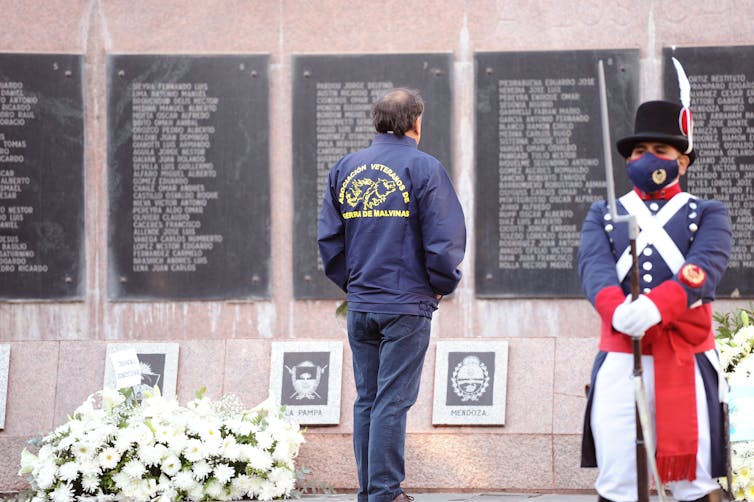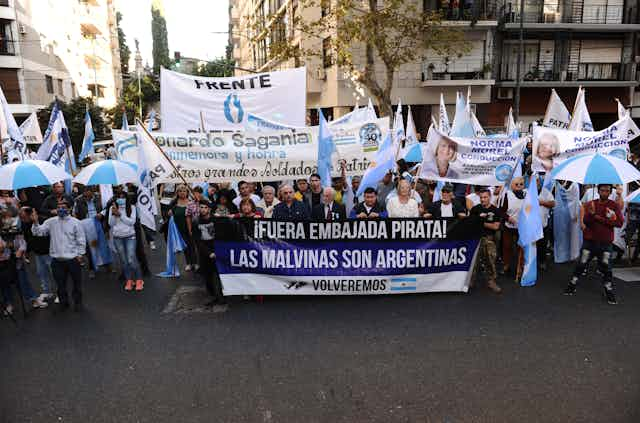At this time of year, the Falkland Islands (or Islas Malvinas) take centre stage in public and political life across Argentina. April 2 marked the 40th anniversary of what many Argentines think of as the “recovery” of an integral part of their national territory from the UK. The “recovery” was only to last for 74 days before a British task force defeated Argentine troops and reclaimed what the UK government recognises as a British overseas territory – the Falkland Islands.
This year, the conflict has been marked with a calendar of events as Argentina continues to try to come to terms with what happened between April and June 1982. The framing of the military campaign in Argentina as territorial “recovery” is important for understanding the continued resonance of the Malvinas sovereignty claim and the emotional legacies wrapped up with the war.
Writing in the UK’s Guardian newspaper on the 40th anniversary of the invasion of the islands, Argentinian foreign minister, Santiago Cafiero, stated that “the recovery of sovereignty [of the Malvinas] is an inalienable objective of the Argentine people”.
This is hardly surprising, given that an amendment to Argentina’s Constitution in 1994 effectively demanded that all subsequent governments commit to “the recovery … and the full exercise of sovereignty” of the Malvinas and other south-west Atlantic territories, which include South Georgia and the South Sandwich Islands.
Between 2003 and 2015, presidents Néstor and Cristina Kirchner placed increased attention on the Malvinas, installing it as a priority issue both in domestic politics and foreign policy. In 2014, Cristina Kirchner established the Malvinas Secretariat to coordinate Argentina’s strategy in relation to the Malvinas sovereignty dispute. It was recently reinstated by the current Argentine president, Alberto Fernández, after being shelved by his predecessor, Mauricio Macri, during his term of office from 2015-2019.
Fernández has also established a National Council for Issues Relating to the Malvinas. This consists of politicians from different political parties, academics and war veterans. The council looks to further strengthen Argentine arguments in relation to the sovereignty dispute. It also aims to develop policies that lead to the islands eventual “recovery”.
The extent of Argentina’s political investment in the Malvinas question is made possible by the omnipresence of the islands in everyday life throughout the country. The outline of the islands is reproduced on road signs, war monuments, company logos and most recently, school uniforms and credit cards.
The slogans “Las Malvinas son Argentinas” (The Malvinas are Argentine) or as the Argentine president more recently stated on Twitter, “Las Malvinas fueron, son y serán argentinos” (The Malvinas were, are and will be Argentine) reinforcing the notion of “recovery” of national sovereignty over the islands, are also a familiar sight in public spaces. A recent government initiative will require all forms of public transport to carry the words “Las Malvinas son Argentinas”.

One could point to these constant reminders as evidence of Argentina’s geopolitical insecurity about its territorial claims in the south-west Atlantic. Politicians in the UK and on the islands themselves regularly point out that this campaign is a political strategy to distract public attention from its economic woes.
And it’s important to acknowledge that not all Argentine citizens read these territorial reminders in ways that are uniformly supportive of the government in Buenos Aires. Some young Argentines are critical of the amount of political energy spent on the “recovery” of the Malvinas. This is particularly the case given the challenges many face in their everyday lives as a result of inflation and broader economic instability.
The ubiquity of references to the Malvinas in Argentine public life begins in Argentina’s schools and are particularly prominent around the anniversary of the war. In primary and secondary schools, Argentine children are reminded of “lost” national territory through the teaching of history and geography.
School classrooms almost always feature a map of the Argentine nation that include territories claimed by Argentina but over which it has no effective jurisdiction. A rousing hymn called the Malvinas March is performed by school children across the country to coincide with the anniversary. Veterans of the Malvinas War regularly visit schools to relay their first-hand accounts, further encouraging an emotional connection with their experiences and the wider cause for which they were fighting.
The fact that most of these soldiers were conscripts, some of whom were mistreated by their superiors during the war, only serves to amplify the poignancy associated with the war’s memory for schoolchildren and adults alike. This is because many young lives were lost in a war that most Argentines continue to see as “just”, partly as a result of the Argentine territorial nationalism described above and hostility towards the history of British colonial influence in the region.
Yet many Argentines also recognise that, just or not, it was a war orchestrated and corrupted by a murderous dictatorship that was responsible for the abuse of civilians and conscripted soldiers alike.
These elements continue to animate the majority of Argentina’s electorate 40 years after the 1982 war according to a recent poll. The poll found that more than 80% of respondents believe that Argentina should continue with its claim for the exercise of sovereignty over the Malvinas.
This overwhelming public support means the Malvinas are an effective rallying call for any government in Argentina, and for this reason efforts to “recover” sovereignty over the islands are unlikely to fade any time soon.

